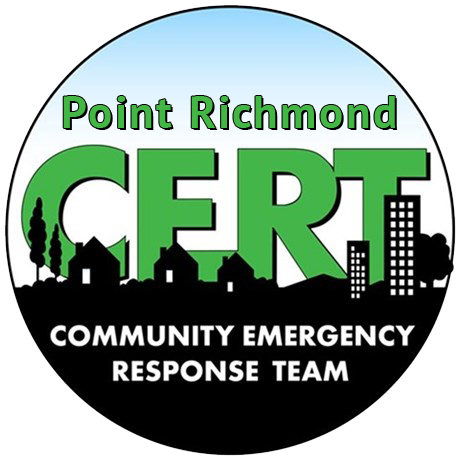WHAT DO THOSE SIRENS MEAN?
by Edie Alderette-Sellers
PR-CERT
CORRECTION: Chevron Richmond Refinery alerted us to a mistake in our schedule. The plant changed its systemwide refinery alerts from Tuesdays to Wednesdays to coincide with the Contra Costa County Emergency Warning System's test. We apologize for any confusion.
One of the most frequent questions we get at Point Richmond CERT is about the warning sirens.
You probably know them well. You're sitting at home and the peaceful quiet is broken by the wailing screech of a World War II–era air-raid siren.
Maybe it's all the movies we've watched, but it's amazing how we're all conditioned to have a little bit of panic when we hear that sound. Our lizard-brains immediately register, "We're under attack!"
But that's not always the case. And being informed about what those sirens are and what to do when you hear them will help you reduce the instinctive fear that inevitably creeps up when we hear that sound.
What are those sirens
Contra Costa County has a very expansive emergency-warning system. The sirens, which are spread throughout the county — from Byron to Richmond — are all connected to the Sheriff's Office Emergency Management division. Managers in that division have the ability to turn them on and off anytime and can turn them on selectively, so you shouldn't hear Richmond's siren go off if there's an emergency in Martinez.
Also, officials at all major refineries in the county have the ability to independently fire them off, if need be, cutting down the time it takes to alert residents if there's an accident at a refinery.
What Does a Siren Mean?
If you hear a warning siren, it means one of two things: Either some event has happened or they're being tested.
How can you tell the difference? Contra Costa County's Emergency Warning System sirens are tested countywide every Wednesday at 11 a.m. for less than three minutes. The first Wednesday of the month is a full-test run, while subsequent Wednesdays are smaller scale. That's why you might hear the siren "blip" on some Wednesdays, but a real full holler on others.
There are also tests of other systems during the week. Mondays at 9 a.m., the Chevron In Plant Evacuation Test occurs, which is internal to Chevron but you might hear some sirens from the plant at those times. Additionally, the Chevron Refinery Alert test, which is also internal but covers all Chevron plants, occurs simultaneously with Contra Costa's warning system on Wednesdays at 11 a.m.
For quick reference, here's a breakdown of all tests we know about:
Mondays 9 a.m. Chevron In-Plant Evacuation Test
Wednesdays 11 a.m. Contra Costa County Emergency Warning System and Chevron Refinery Alert tests (Systemwide)
If you hear a siren at any time OTHER than those times, it likely means some event has happened. Your area may, or may not, be affected, and the only way to know is to get more information.
What Do I Do When I Hear a Siren?
First, check your calendar and watch. If it's during one of the above-mentioned test times, don't worry about it. Carry on with your day.
If you hear a siren that's not during a test time, do four things:
Get yourself, your family, and your pets inside;
Close your windows and doors, close your fireplace vent, and turn off your A/C;
Turn on your radio to AM740 and listen for info;
If you have internet, go to www.cwsalert.com.
This procedure is called a "shelter in place." But sheltering is only part it. Getting info is just as important. If the emergency is affecting you, you'll need to know instructions, and if it's not in your area you may not need to shelter. That's one of the downsides of sirens — they aren't good at conveying any information other than, "Hey, something's wrong," and they don't discriminate between who's really needing the warning and who isn't.
While radio is an excellent informational tool, it's also not the only tool. The county's system is more than just sirens; it's also integrated with an information website and a text message system. When the sirens sound, the website is automatically updated with the details of the event and the area affected.
The text system is also simultaneously activated with the siren alert to everyone who has registered a cel phone number with the system. Voice calls may also be sent to area phone numbers, but they are going to go out slower (because voice phone exchanges can only do so many calls at a time), and they'll only go to listed phone numbers. So, as you can see, text is king!
How do you get your cel phone number registered to receive texts? It's fast an easy online. Just go to www.cwsalerts.com registration page (best from a desktop and not a mobile device). You can register for one location or multiple locations in the county, so you can get alerts about your home area, your school area, and your work area.
A final source of info is the PR-CERT Facebook page and Twitter accounts. PR-CERT members are all registered to receive this info, and assuming our internet is working, we update with info as we get it from the county's website.

